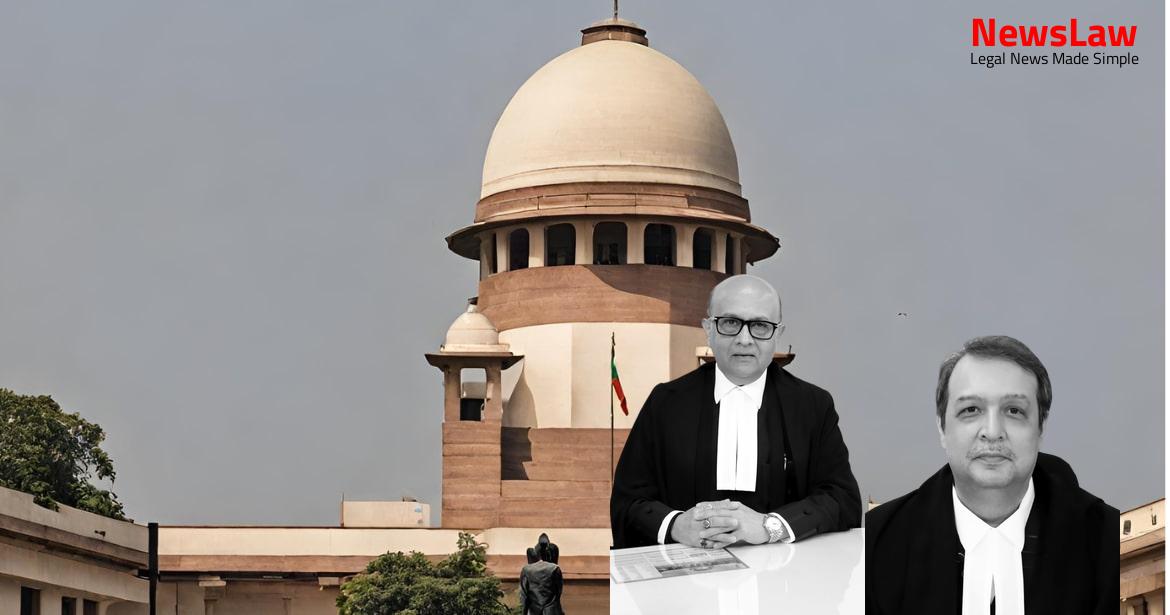Exploring the intricate legal analysis by the court in setting aside an auction sale due to non-compliance with statutory provisions. The case emphasizes the significance of following rules and regulations in property sales, shedding light on the complexities of debt recovery processes. Join us in uncovering the court’s in-depth examination of the auction sale scenario.
Facts
- A Recovery Certificate was issued in favor of the appellant-bank under Section 101 of the MCS Act, 1960.
- Proclamations were published in the newspaper as per MCS Rules, 1961.
- No objections were raised before the Recovery Officer regarding irregularities or fraud.
- Auction proceedings were challenged by respondent no.1 before the Divisional Joint Registrar.
- An FIR was lodged by the bank officers due to an attack while acquiring possession of the property.
- Approval was received from the District Deputy Registrar to accept the balance amount from the auction purchaser.
- Respondent no.1 challenged the upset price fixed by the Deputy Joint Registrar.
- Properties were mortgaged with the appellant-bank and Vaidanath Bank.
- Sale Certificates were issued in favor of the auction purchaser.
- Various writ petitions were filed by respondent no.1 challenging the auction proceedings and recovery certificate.
- Tender notices were issued by the appellant-bank for selling mortgaged properties.
- Highest bidder offered Rs. 1,26,00,000/- for the properties and deposited 15% of the amount on the same day.
- High Court quashed criminal proceedings initiated by respondent no.1 against bank officers and others in FIR No 138/2011.
- High Court set aside auction sale due to non-compliance of mandatory provisions of MCS Rules, 1961.
- High Court allowed Writ Petition No 570/2012 and set aside auction sale of lands survey nos. 440, 437, and 102 dated 29.11.2010.
- High Court also set aside Sale Certificate in favor of auction purchaser and directed the bank to refund the sale price with interest.
Also Read: Ruling on Circumstantial Evidence in Murder Case
Arguments
- Appellant-bank argues that respondent no.1 filed multiple proceedings in different courts to delay debt recovery.
- High Court judgment was erroneous as it considered the date of publication of notice as the proclamation date.
- Appellant argues that failure to deposit the full amount within stipulated time vitiates the auction process.
- Property sold for a low price, leading to substantial loss for the appellant.
- High Court wrongly asked the bank to repay the sale price to the auction purchaser.
- Auction purchaser argues that the balance amount was deposited within the required time frame as per circular.
- Appellant in Civil Appeal No. 818/2022 contests respondent no.1’s lack of repayment since 2010.
- High Court’s decision to set aside the sale deemed erroneous by the appellants.
- Challenges to auction sale not found maintainable by the appellants.
- High Court’s failure to consider respondent no.1’s conduct in the earlier litigations.
- High Court correctly identified breaches of Rules 107(11)(e), 107(11)(f), 107(11)(g) & 107(11)(h) of the MCS Rules, 1961.
- Condition precedent for taking away someone’s property or disposing of secured assets is compliance with statutory provisions.
- In the present case, auction sale and property sale did not follow statutory provisions.
- The property was sold at a lower price.
- The High Court rightfully quashed and set aside the auction and sale in favor of the auction purchaser.
- Prayer for dismissal of present appeals based on above submissions and cited decisions.
Also Read: Challenging Legal Presumptions in Negotiable Instrument Cases
Analysis
- The borrower attempted to delay the auction/sale proceedings at every stage without making any payments.
- The borrower failed to apply to set aside the auction sale within the required period of thirty days.
- The borrower challenged the auction proceedings in various ways but did not raise objections at the appropriate times.
- The High Court erred in entertaining the borrower’s writ petition and setting aside the auction sale without valid grounds.
- The borrower’s conduct throughout the proceedings aimed to stall the auction without fulfilling payment obligations.
- The borrower’s actions of obtaining stays and delaying tactics were considered by the court as attempts to delay the sale.
- The High Court’s decision to set aside the auction sale was deemed contradictory to the MCS Rules and not supported by the borrower’s actions.
- The High Court’s finding that a fresh proclamation should have been issued due to a postponed auction was challenged as factually incorrect.
- The borrower did not pay any loan amounts since 2010, leading to substantial due amounts.
- Rule 107(14) allows an applicant to apply within thirty days from the date of the sale of immovable property to set aside the sale on grounds of irregularity, mistake, or fraud.
- If the application is allowed, the Recovery Officer can set aside the sale and may direct a fresh one.
- If no application is made or if the application is rejected after thirty days, the District Deputy Registrar shall confirm the sale. However, the sale can still be set aside by the Registrar if there are other valid grounds.
- The purchaser’s deposit or purchase money shall be returned if the sale is not confirmed or is set aside.
- After confirmation of the sale, the District Deputy Registrar shall grant a certificate of sale to the purchaser.
- Reliance on decisions of the Court in Shilpa Shares and Securities and Balram cases not applicable to the present case
- Findings recorded in the current case are different from those in the mentioned cases
- Previous decisions do not apply to the facts of the present case
Also Read: Legal Analysis Critique in High Court’s Quashing Order
Decision
- The present appeals are allowed
- The impugned judgment and order dated 30.07.2021 passed by the High Court of Bombay, Bench at Aurangabad in Writ Petition No 570/2012 is quashed and set aside
- Consequently, Writ Petition No 570/2012 filed by the borrower-respondent no.1 is dismissed
- The time for production of the encumbrance certificate may be extended at the discretion of the Sale Officer or the Recovery Officer
Case Title: DEENADAYAL NAGARI SAHAKARI BANK LTD. Vs. MUNJAJI (2022 INSC 191)
Case Number: C.A. No.-000818-000818 / 2022



